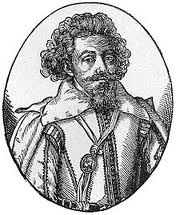February 11, 2019. Praetorius and Cavalli. A prolific and talented German composer of the late Renaissance, Michael Praetorius was born on February 15th of 1571. We dedicated an entry  to him quite recently, so this time we’ll just play one of his pieces. Praetorius wrote more than 1000 sacred compositions and only one secular collection of French dances, which he called Terpsichore. Here’s one of them, La Bourrée. The unusual and very refreshingly sounding wind instrument you hear in this piece is called Rackett. Racketts come in four sizes, from soprano to great bass. Praetorius, who was not only a composer but also a musicologist, wrote about racketts in his book Syntagma Musicum: “In resonance racketts are quite soft, almost as if one were blowing through a comb. They have no particular grace when a whole consort of them is used together; but when viols da gamba are used with them, or when a single rackett is used together with other wind or stringed instruments and a harpsichord or the like, and is played by a good musician, it is indeed a lovely instrument. It is particularly pleasing and fine to hear in bass parts.”
to him quite recently, so this time we’ll just play one of his pieces. Praetorius wrote more than 1000 sacred compositions and only one secular collection of French dances, which he called Terpsichore. Here’s one of them, La Bourrée. The unusual and very refreshingly sounding wind instrument you hear in this piece is called Rackett. Racketts come in four sizes, from soprano to great bass. Praetorius, who was not only a composer but also a musicologist, wrote about racketts in his book Syntagma Musicum: “In resonance racketts are quite soft, almost as if one were blowing through a comb. They have no particular grace when a whole consort of them is used together; but when viols da gamba are used with them, or when a single rackett is used together with other wind or stringed instruments and a harpsichord or the like, and is played by a good musician, it is indeed a lovely instrument. It is particularly pleasing and fine to hear in bass parts.” .jpg) Hard to disagree, it is a lovely instrument indeed.
Hard to disagree, it is a lovely instrument indeed.
Francesco Cavalli was born Francesco Caletti on February 14th of 1602 in Crema, Lombardy. His first patron, the Venetian Governor’s name was Federico Cavalli. Cavalli heard Francesco sing in the local cathedral and convinced the boy’s family to let him take Francesco to Venice. Some years later, already a well-known composer, Francesco assumed the name of his first patron. In 1639 Cavalli won a competition to become the second organist at St. Mark’s; that same year he composed his first opera, Le nozze di Teti e di Peleo. Even though at the time operas had been played in private houses for about 40 years, it had just been two years since this art form became available to a broad paying public. Le nozze was staged at Teatro San Cassiano, Venice’s first public opera house, opened in 1637. During the following 10 years Cavalli wrote eight more operas, Giasone becoming one of the most popular in all of Italy. In the following years, Cavalli, together with his favorite librettist, Giovanni Faustini, worked in the newly established Sant' Apollinare theater, famous for its advanced stage machinery. Faustini died in 1661, and Cavalli moved to the Teatro Santi Giovanni e Paolo, which was managed by Marco Faustini, Giovanni’s brother. Santi Giovanni e Paolo was considered the most comfortable of all opera theaters in the city (by the end of the 17th century Venice had 10 of them). These years saw the creation of Egisto, Xerse and Erismena, which, together with Giasone, became the staples of the opera repertoire and were performed all over Italy, in cities large and small. In 1660 Cardinal Mazarin, the French Prime Minister (he was an Italian born Giulio Raimondo Mazzarino) invited Cavalli to Paris to compose an opera for the planned marriage of Louis XIV to Maria Theresa, daughter of the King of Spain. The visit, which lasted almost two years (the new Tuileries theater, where the opera was supposed to be staged, had not been completed, as promised) was not a happy affair.
Jean-Baptiste Lully schemed against his rival, and with the death of Mazarin in March of 1661 the influence of all things Italian had waned. Cavalli composed the opera Ercole amante (it was successfully staged in Chicago a couple years ago) but the temporary theater in which it was premiered had terrible acoustics. Plus, Lully came up with additional ballet numbers, making the performance way too long, but the dances was the only thing that got the King interested. Cavalli left France in May of 1662. Back in Venice, he was made the maestro di cappella of St. Mark’s in 1668 but continued composing operas: altogether, he wrote more than 40. Cavalli died in Venice on January 14th of 1676. Here’s the aria Delizie, contenti from his opera Giasone. The counter-tenor Christophe Dumaux is Giasone, Federico Maria Sardelli conducts the Symphony orchestra of Flemish opera Antwerp/Ghent.
| Source: | https://www.classicalconnect.com/node/12860 |
| Website: | Classical Connect |